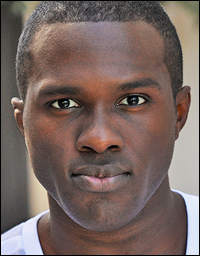
*
The second coming of Violet, the 1997 Off-Broadway musical by Jeanine Tesori (music) and Brian Crawley (book and lyrics), amounts to a modest miracle, as far as man-made miracles go, and it couldn't happen to a nicer girl who believes in miracles.
The title character — in short-story form, "The Ugliest Pilgrim" by Doris Betts — is a trusting young farm girl from Spruce Pine, N.C., who hops a Greyhound to get to her miracle, which happens to be in Tulsa in the form of a faith-healing televangelist.
What she had in mind was a face-healing. When she was 13, watching her father chop wood, the shim of his axe blade suddenly came loose and struck her across the face, leaving a ghastly gash that runs from her nose all the way down her left cheek.
Sutton Foster is playing the part without benefit of makeup or even a Phantom of the Opera mask — through a stage technique commonly known as Elephant Man-itis. That's when a disfigured character is presented as a beautiful young man in a loincloth and you say, "What scars?" Foster's scars are similarly invisible. And that's the whole point of the piece, contended the actress. "Everybody has scars. Some you can see and some you can't. Violet's was literally given to her by her father — accidentally, but nevertheless."
Foster conceded, "I think we all carry around these scars that we deal with every day. And there is something about this character that resonates on a deep level with me personally.
"I think I can pull from a lot of my own experiences. My own upbringing definitely correlates with her story. I grew up in the South and watched televangelists... I know what it's like to believe in something so much you think it'll take away all pain and suffering. To play a character who learns to forgive, learns to love, learns to accept is great. These are all themes I know I can relate to and others can, too."
During this long bus ride into self-awareness, which officially opens April 20 at Roundabout's American Airlines Theatre, and runs until Aug. 10, Violet falls in with a couple of soldier-boys fresh from basic training and bound for Fort Smith — Monty (Colin Donnell), a lover-boy type, and Flick (Joshua Henry), an African-American who, it being the South of 1964, is also sensitive about how he looks to others.
"One unique thing about Flick and Monty is that the scar does not affect them the way it affects other people," Donnell noted. "The reason Violet attaches herself to us — and us to her — is we're unaffected by it. Shortly after meeting, we joke about it. For whatever reason, we are able to see the person beyond the disfigurement."
| |
 |
|
| Joshua Henry |
He has a new song in the works that he hopes will take the negative edge off his role. "Monty has a song where he keeps saying, 'You're Different,' so whatever it is it'll be different from 'You're Different.' The great thing about having Jeanine and Brian so involved in the process again is that they're really re-attacking the material and re-investigating all they did in 1997, looking at it 17 years later with fresher eyes."
Henry will stick with the songs he was dealt, among them "Let It Sing," a gospel showstopper. "I think that's Flick's creed," he said. "His mother — like mine — taught him [that] your voice matters. Your path in life doesn't have to be like everyone else's. You're a unique individual, and you don't have to prove things to others."
The City Center resurrection, which was newly reconfigured as a one-act by director Leigh Silverman, took eight days to mount, and the rethinking continues. "We're digging deeper," admitted Henry. "Jeanine doesn't want a song just for the sake of a song. She's questioning everything, making sure every song is earned, and, if it's not, she's the first to say, 'Let's get it out of there.' It's crazy to hear a composer say that out loud."
In a sense, Tesori made her own miracle. As artistic director of the 2013 Encores! Off-Center series at City Center, she tapped Violet for a one-night-only revival. "She was reluctant to do that," said Foster. "Violet was her first heartbreak. When it opened at Playwrights Horizons, there was this momentum and hope it'd go to Broadway, but it didn't transfer. I think she was nervous to poke at it again. "But this turns out to be a great time to bring it back, especially in an age when people have such an obsession for physical beauty, when people can go and change their looks whenever they want. For thousands of dollars, they can be who they want to be. Violet has a song where she describes Judy Garland's chin and Grace Kelly's nose and Rita Hayworth's skin. In this day and age, you can buy all that!"











